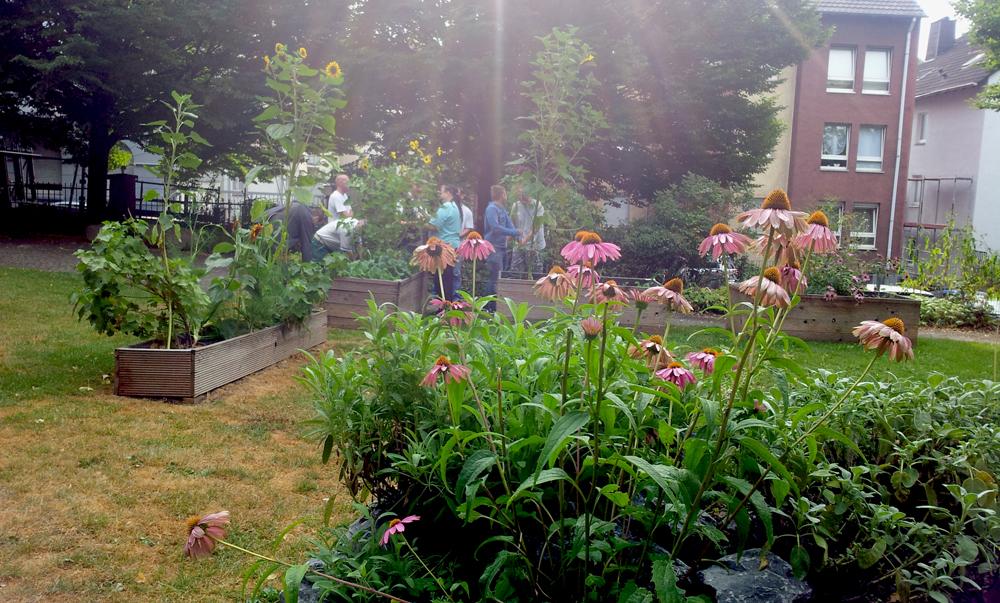The urban gardening project is a strategic employment and qualification measure which accommodates 14 long-term unemployed people guided and advised by 4 part-time employees of the Wuppertal District Service, consisting of a professional gardener, an instructor, a social education worker and a project manager. Coordinated with the Forestry Department of Wuppertal and the City of Wuppertal and in collaboration with non-governmental organizations, the participants of the programme plant and harvest vegetables and herbs in 19 high-raised flower beds on decentralized public and private spaces across the Ostersbaum district. The harvest is distributed to and shared by all residents. (Ref. 3) A further goal of the intervention is to increase cultivated green spaces and streets in the city district of Ostersbaum and thus to enhance the quality of life in the district. In 2017, the project was extended with an opportunity for beekeeping. (Ref. 8) Apart from its main goal of providing employment and assistance to unemployed people, the leaders of the project also offer educational opportunities for children and students, through educating them about the cycle of food production and creating an understanding of the origin of food. (Ref. 1)
Overview
Nature-based solution
- Parks and urban forests
- Pocket parks/neighbourhood green spaces
- Community gardens and allotments
- Allotments
- Community gardens
Key challenges
- Green space, habitats and biodiversity (SDG 15)
- Habitat and biodiversity conservation
- Green space creation and/or management
- Social justice, cohesion and equity (SDG 10)
- Environmental education
- Economic development and employment (SDG 8)
- Employment/job creation
Focus
Project objectives
Implementation activities
Biodiversity conservation or restoration-focused activities
Biodiversity conservation:
- Protect and enhance urban habitats
- Create new habitats
- Protect species
- Undertake specific measures to protect species
- Undertake specific measures to protect valued species
- Means for conservation governance
- Raise public awareness
Main beneficiaries
- Citizens or community groups
- Marginalized groups: Other
- Young people and children
Governance
Management set-up
- Co-governance with government and non-government actors
Type of initiating organisation
- Local government/municipality
- Public sector institution
Participatory approaches/ community involvement
- Joint implementation (e.g. tree planting)
Details on the roles of the organisations involved in the project
Project implemented in response to ...
Financing
Total cost
Source(s) of funding
- Public local authority budget
- Other
Type of funding
- Earmarked public budget
- Direct funding (grants, subsidies, or self-financed projects by private entities)
Non-financial contribution
- Provision of labour
- Citizens (e.g. volunteering)
Impacts and Monitoring
Environmental impacts
- Environmental quality
- Improved air quality
- Green space and habitat
- Increased green space area
- Increased conversion of degraded land or soil
- Increased number of species present
- Enhanced support of pollination
Economic impacts
- Increase of green jobs (e.g. paid employment positions)
Socio-cultural impacts
- Social justice and cohesion
- Increased opportunities for social interaction
Type of reported impacts
Presence of formal monitoring system
Presence of indicators used in reporting
Presence of monitoring/ evaluation reports
Availability of a web-based monitoring tool
References
2. Stadt Wuppertal Stabsstelle Bürgerbeteiligung (2017) Bürgerbudget Wuppertal - 150.000 Euro für deine Ideen! Available at: Source link [Accessed: 08 Sept. 2020].
3. Nachbarschaftsheim Wuppertal (2016) ‘Maßnahme Urban Gardening. Konzept’. Wuppertal.
4. Nachbarschaftsheims Wuppertal e.V. (no date) Stadtteilservice Ostersbaum. Berufsintegration und Qualifizierung. Available at: Source link 08 Sept. 2020].
5. Stadt Wuppertal (2017) Soziale Stadt Source link unavailable in 2020]
6. Jobcenter Wuppertal (no date) 10 Jahre Stadtteilservice Wuppertal. Available at: Source link 08 Sept. 2020]
7. Stadt Wuppertal (2011) Ein Berg voller Ideen. 14 Jahre Stadtteilprojekt Ostersbaum 1998 – 2011. Available at: Source link 08 Sept. 2020]
8. Nachbarschaftheim Wuppertal e.V. (nd.) Haben Sie Lust auf Gärtnern? [online]. Available at: Source link [Accessed: 08 Sept. 2020].

